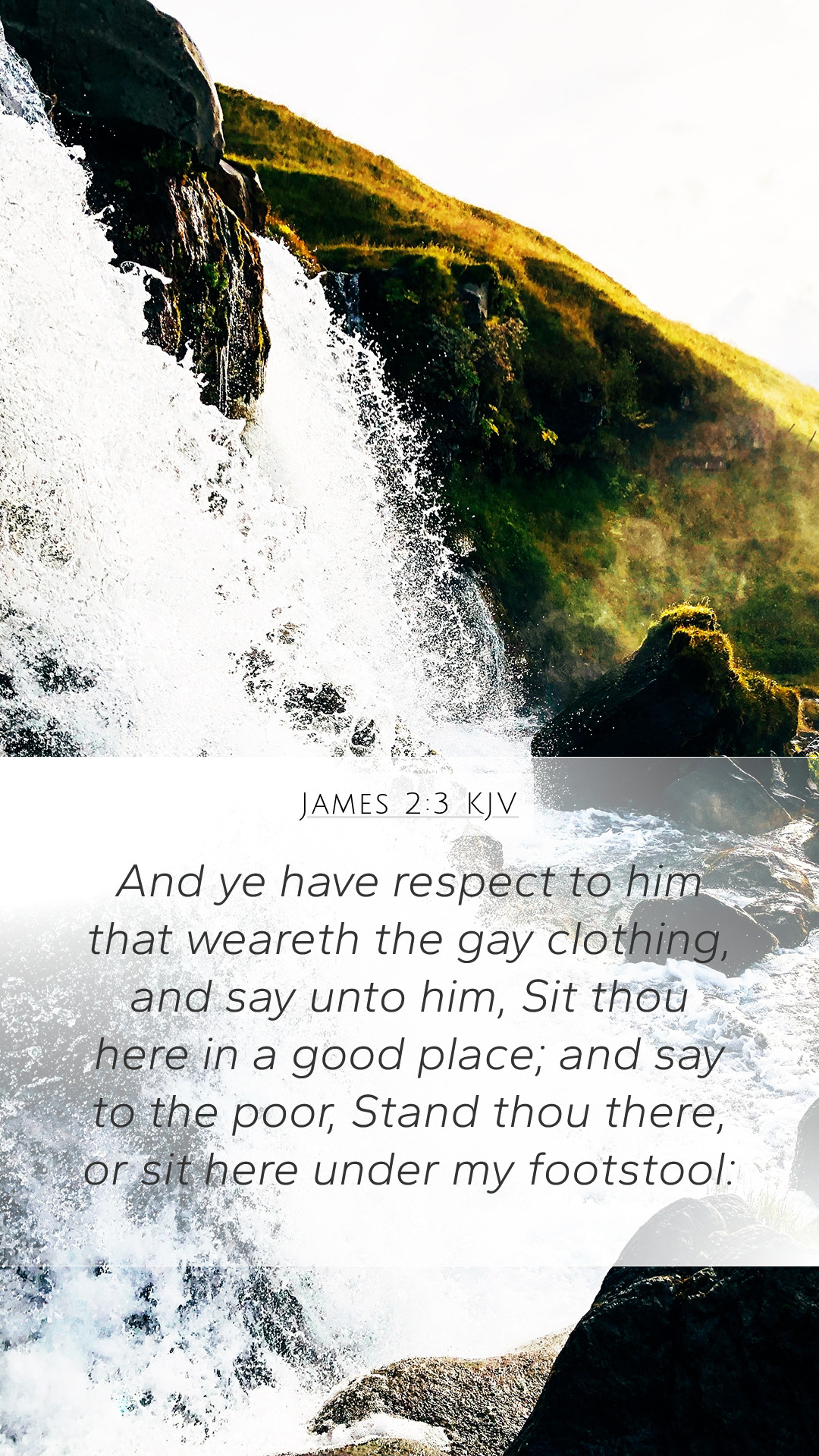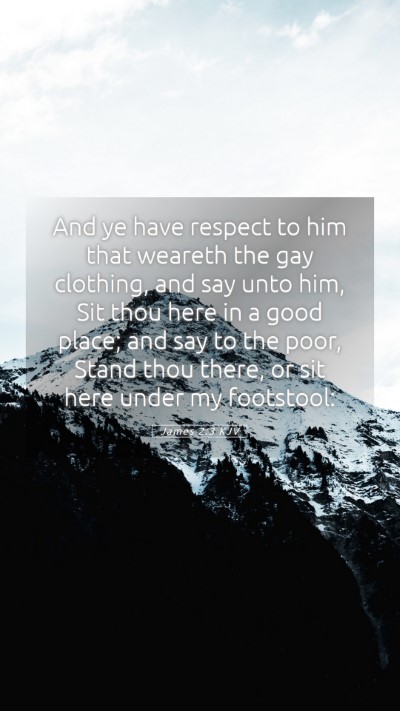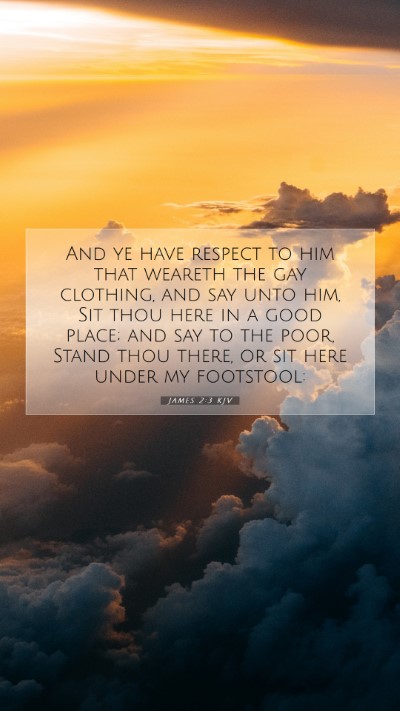Old Testament
Genesis Exodus Leviticus Numbers Deuteronomy Joshua Judges Ruth 1 Samuel 2 Samuel 1 Kings 2 Kings 1 Chronicles 2 Chronicles Ezra Nehemiah Esther Job Psalms Proverbs Ecclesiastes Song of Solomon Isaiah Jeremiah Lamentations Ezekiel Daniel Hosea Joel Amos Obadiah Jonah Micah Nahum Habakkuk Zephaniah Haggai Zechariah MalachiJames 2:3 Meaning
What is the meaning of James 2:3?
And ye have respect to him that weareth the gay clothing, and say unto him, Sit thou here in a good place; and say to the poor, Stand thou there, or sit here under my footstool:
James 2:3 Bible Verse Meaning
Understanding James 2:3: A Comprehensive Bible Verse Commentary
James 2:3 states, "And you pay attention to the one wearing the fine clothes, and say to him, 'You sit here in a good place,' and say to the poor man, 'You stand there,' or 'Sit here at my footstool,'" (NKJV). This verse speaks to the issue of favoritism and discrimination within the Christian community. Here, we will delve into the meanings and interpretations of this verse, combining insights from renowned public domain commentaries to provide thorough Bible verse explanations.
1. The Sin of Partiality
In this passage, the apostle James addresses a critical issue in the early church: the sin of favoritism. According to Matthew Henry, showing partiality—especially towards the wealthy—reflects a lack of true Christian love and undermines the value of every individual in the eyes of God. This practice not only favors the rich over the poor but also demonstrates a judgment based on outward appearances rather than character or faith.
2. Contextual Analysis
Albert Barnes highlights that James is addressing believers and admonishing them to avoid distinctions based on social status. When Christians exhibit preference towards certain individuals—like the well-dressed rich person—they create divisions within the church that contradict the teachings of Jesus, who welcomed all, regardless of social or economic status.
The admonition has a dual purpose: it condemns the behavior while seeking to establish the idea that God’s love is impartial, urging believers to reflect this quality in their interactions.
3. Reflecting God’s Character
Adam Clarke adds that Christians are called to reflect the character of God, who is described in Deuteronomy 10:17 as one who shows no partiality. By favoring the wealthy, Christians not only contradict their own faith but also impair their witness to the world. God’s grace extends to the poor and downtrodden, and denying them dignity diminishes the community of believers' collective testimony.
4. Social Justice Issues
The verse also highlights important social justice concerns that are echoed throughout Scripture. For example, in Proverbs 22:2, it is stated, "The rich and the poor meet together; The Lord is the maker of them all." This illustrates that God created all human beings equally, regardless of their economic status. Favoritism thus violates the fundamental Christian principle of love and equity.
5. Practical Application
To truly embody the teachings of James 2:3, Christians are called to practice inclusivity and love. Understanding this scripture allows for practical applications in everyday life:
- Recognize and challenge any biases in your social circles or community gatherings.
- Engage with and support those who are marginalized or who live in poverty.
- Encourage others in your Bible study groups to reflect on their attitudes towards wealth and poverty.
- Utilize Bible study tools to gather a broader understanding of social justice themes present in scripture.
6. Reflection Questions
To facilitate deeper Bible study insights or discussions, consider the following questions:
- How can we actively combat favoritism in our church or community?
- What steps can we take to ensure that our actions align with the teachings of Jesus concerning the poor?
- In what ways does this passage challenge our perceptions of wealth and status?
7. Related Bible Cross References
This verse can be cross-referenced with:
- 1 Samuel 16:7 - "For the Lord sees not as man sees: man looks on the outward appearance, but the Lord looks on the heart."
- Proverbs 28:21 - "To show partiality is not good, because for a piece of bread a man will transgress."
- Galatians 3:28 - "There is neither Jew nor Greek, neither slave nor free, nor is there male and female, for you are all one in Christ Jesus."
Conclusion
In summary, James 2:3 serves as a profound reminder of the importance of equality and love within the Christian community. Through the lens of various public domain commentaries, we gain a deeper understanding of Scripture that encourages us to fight against societal inequalities and foster a spirit of unity. Focusing on Bible verse meanings and interpretations empowers us to live out our faith authentically. Engaging with these teachings through Bible study plans enables us to apply God’s word in ways that promote inclusiveness and compassion in our daily lives.


